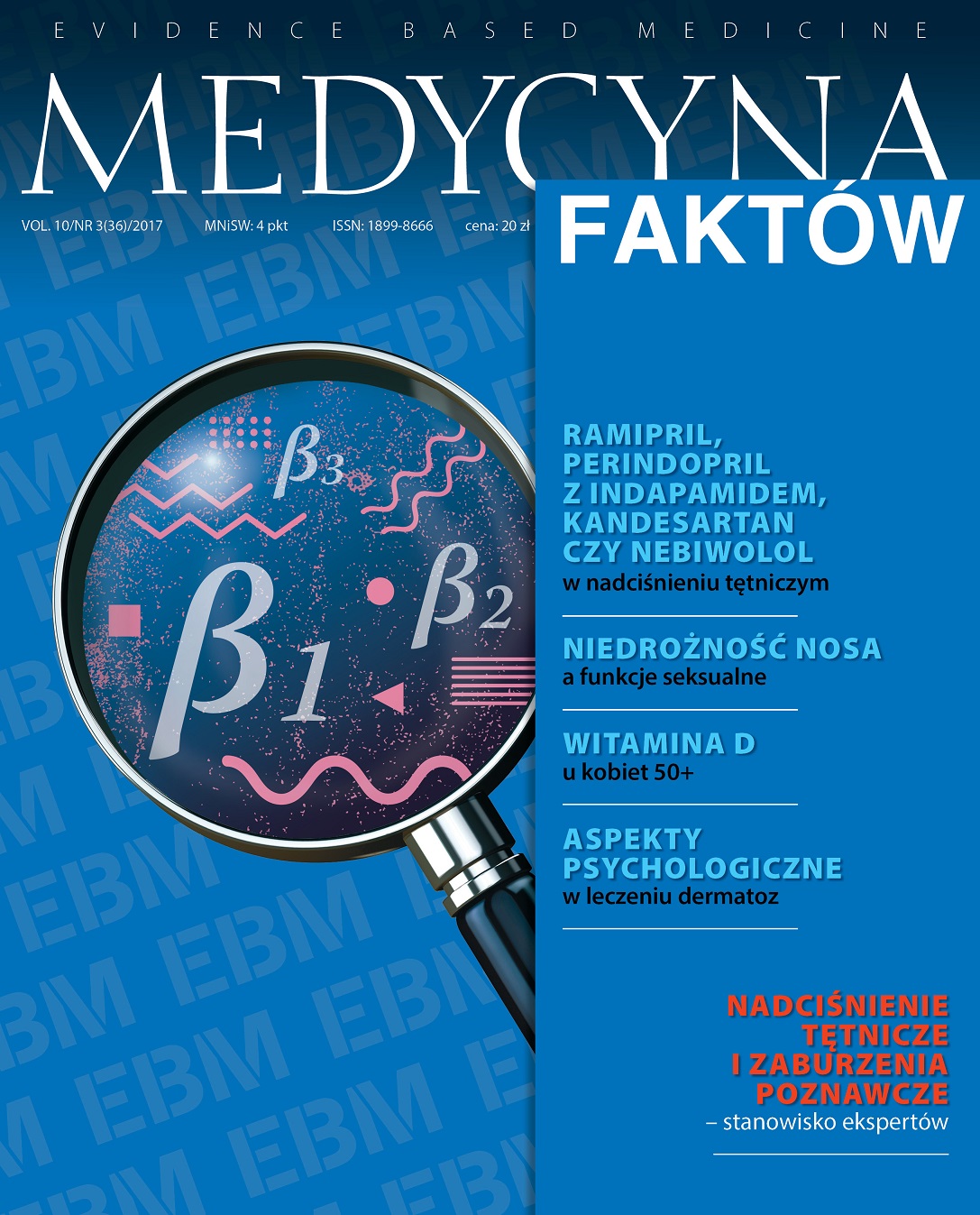Psychotherapy and psychological support of dermatological patients Review article
Main Article Content
Abstract
Psychological support, especially for patients with chronic dermatoses should be an important complement to typical dermatological treatment. Both, the fact that skin lesions are visible to others and that they are often chronic, are a source of mental discomfort for patients, sometimes leading to coexisting depressive and anxiety symptoms. Treatment limited only to skin lesions frequently remains insufficient. First, attention should be paid to psychoeducation, second to the various forms of psychotherapy. Sometimes it is advisable to take psychiatric treatment. A separate group constitute patients with psychodermatoses who should be treated with psychiatric agents.
Article Details
How to Cite
Pacan, P., & Szepietowski, J. (2017). Psychotherapy and psychological support of dermatological patients. Medycyna Faktow (J EBM), 10(3(36), 217-220. Retrieved from https://journalsmededu.pl/index.php/jebm/article/view/2127
Issue
Section
Articles
Copyright ? by Medical Education. All rights reserved.
References
1. Gawłowska-Sawosz M., Wolski M., Kamiński A. et. al.: Trichotillomania and trichophagia ? diagnosis, treatment, prevention. The attempt to establish guidelines of treatment in Poland. Psychiatr. Pol. 2016; 50: 127-143.
2. Harth W., Gieler U., Kusnir D., Tausk F.A. (red.): Secondary emotional disorder and comorbidities. W: Clinical Management in Psychodermatology, Springer-Verlag, Berlin-Heidelberg 2009; 123-138.
3. Hawro T., Miniszewska J., Chodkiewicz J. et al.: Anxiety, depression and social support in patients with psoriasis. Przegl. Lek. 2007; 64: 568-557.
4. Jafferany M., Franca K.: Psychodermatology: basics concepts. Acta Derm. Venereol. 2016; suppl. 217: 35-37.
5. Koo J.Y.M., Lee C.H.: Psychocutaneous medicine. Marcel Dekker Inc., New York, Basel, 2003.
6. Lepping P., Freudenmann R.W.: Delusional parasitosis: a new pathway for diagnosis and treatment. Clin. Exp. Dermatol. 2008; 33: 113-117.
7. Marshall C., Taylor R., Bewley A.: Psychodermatology in clinical practice: Main principles. Acta Derm. Venereol. 2016; suppl 217: 30-34.
8. Phillips K.A., Dufresne R.G. Jr: Body dysmorphic disorder: a guide for primary care physician. Prim. Care 2002; 29: 99-111.
9. Szepietowski J., Pacan P., Reich A., Grzesiak M.: Psychodermatologia. Akademia Medyczna im. Piastów Śląskich, Wrocław 2012.
10. Tuckman A.: The potential psychological impact of skin conditions. Dermatol. Ther. (Heidelb). 2017; suppl 1: 53-57.
2. Harth W., Gieler U., Kusnir D., Tausk F.A. (red.): Secondary emotional disorder and comorbidities. W: Clinical Management in Psychodermatology, Springer-Verlag, Berlin-Heidelberg 2009; 123-138.
3. Hawro T., Miniszewska J., Chodkiewicz J. et al.: Anxiety, depression and social support in patients with psoriasis. Przegl. Lek. 2007; 64: 568-557.
4. Jafferany M., Franca K.: Psychodermatology: basics concepts. Acta Derm. Venereol. 2016; suppl. 217: 35-37.
5. Koo J.Y.M., Lee C.H.: Psychocutaneous medicine. Marcel Dekker Inc., New York, Basel, 2003.
6. Lepping P., Freudenmann R.W.: Delusional parasitosis: a new pathway for diagnosis and treatment. Clin. Exp. Dermatol. 2008; 33: 113-117.
7. Marshall C., Taylor R., Bewley A.: Psychodermatology in clinical practice: Main principles. Acta Derm. Venereol. 2016; suppl 217: 30-34.
8. Phillips K.A., Dufresne R.G. Jr: Body dysmorphic disorder: a guide for primary care physician. Prim. Care 2002; 29: 99-111.
9. Szepietowski J., Pacan P., Reich A., Grzesiak M.: Psychodermatologia. Akademia Medyczna im. Piastów Śląskich, Wrocław 2012.
10. Tuckman A.: The potential psychological impact of skin conditions. Dermatol. Ther. (Heidelb). 2017; suppl 1: 53-57.

